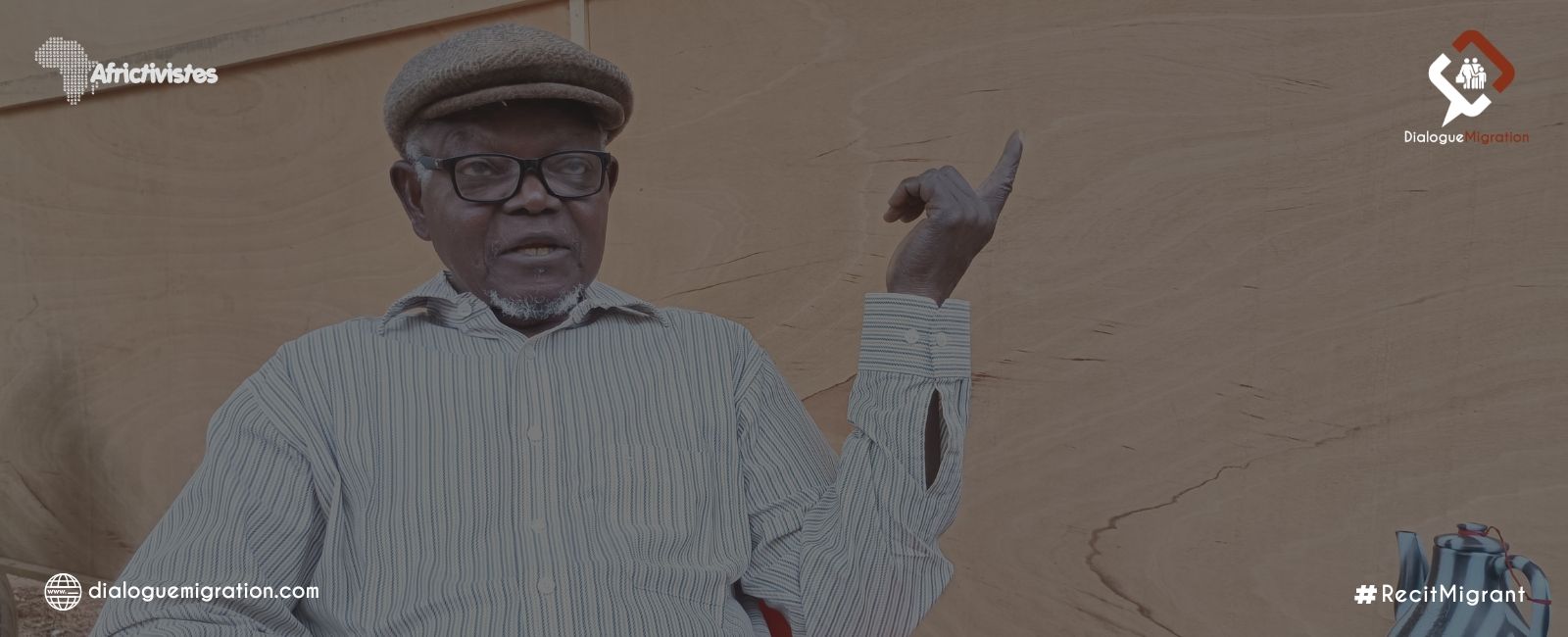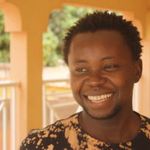

He landed in Upper Volta, now Burkina Faso in 1980. Arriving in the land of “upright people” for his university studies, following the closure of the University of N’Djamena due to the civil war that broke out on February 12, 1979 in Chad, Ngonndingamlemgoto Alram Nguebnan Ngarndolédjim settled permanently in Ouagadougou, his childhood dream city.
Filmmaker, professional storyteller, teacher in the Universities and higher education Institutes of Burkina Faso, Ngonndingamlemgoto welcomed us at the headquarters of his theater company Le Roseau. Between nostalgia and dreams of a better future for his country, Chad, he narrates his story in a captivating storytelling style.
Ngonndingamlemgoto Alram Nguebnan Ngarndolédjim’s life changed on February 12, 1979, when the civil war broke out in Chad and that student life in N’Djamena was going to take a shocking turning point. The Chadian conflict lasted almost ten months, forcing the closure of the University of N’Djamena where the one affectionately called “Ngone ” was studying Modern Languages. Following this abrupt closure, students and pupils had to return to their places of origin. It was at this time that Ngone returned to Bebidja, his native village. There, the student taught French at the newly established high school while hoping for a return to normal life in order to resume his university studies. The crisis worsened as time went by. An alternative had to be found to allow the students to return to the lecture halls. Thus, the State allowed them to go abroad to continue their studies.
Each student had to choose three destinations in order of preference. Upper Volta, Côte d’Ivoire and Senegal were the host countries subject to Ngone’s choice. And it is in Upper Volta that he will be sent, as he wished. “It was a burst of joy,” says the future student at the University of Ouagadougou, now Professor Joseph Ki Zerbo’s University.
Seeing Ouagadougou and Bobo-Dioulasso was a childhood dream for him. Indeed, he says, “in a calculation book of the primary school, I used to read the story of a train that left Abidjan in Côte d’Ivoire to reach the two largest cities of Burkina Faso (Upper Volta at the time), Ouagadougou and Bobo-Dioulasso. And since then, I wanted to visit these two cities before I die.”
Moving to Ouagadougou was a childhood dream
Something that was now done on December 8, 1980 at 1:00 p.m., says Ngone, 30 years later. There were 26 Chadian students who set foot on the soil of Upper Volta that day with assistance from the French Cooperation, which had already prepared accommodation for them. “When I got off the plane, I kissed the ground first,” he recalls. The risk of changing environment was zero because for him, the climate is identical to that of N’Djamena.
At the University of Ouagadougou, Ngone enrolled in Linguistics. He remembers that their integration was without difficulty: “according to history, the Gourmantché and Mossi (editor’s note: ethnic groups) came from Chad so the Burkinabe students considered themselves as our relatives ,” he says proudly.
A French language teacher, director, professional storyteller, film actor, Ngone, respectfully called ‘the ancestor’ by young people in the cultural milieu, is a more disciplined man. His history is as long as his name. In love with theater since his childhood, he practiced this art before flying to Ouagadougou where his first concern was to join a theater company. This is how the “ancestor” joined the troupe “Les amateurs” which later became the Burkinabe theater workshop. He was there from 1981 to 1995. Subsequently, the man of culture created his own troupe, the theater company “Le Roseau” in the Wemtenga district in the heart of Ouagadougou.
43 years away from home
In his career, he has trained several young people and says he continues to do so since he currently teaches at the Centre de formation et de recherche en art vivant de l’Espace Gambidi. He also lectures in public speaking at the Professor Joseph Ki Zerbo University at the UFR LAC.
After nearly 43 years in Burkina Faso, far from his native Chad, the septuagenarian is nostalgic. “I am only waiting for an opportunity to return home to Chad that I miss so much,” especially since he has only visited Chad once in 2009 as part of a theatrical performance. If he has spent so many years abroad, he says, it is because of the insecurity that his country has been plagued by for years because of the incessant wars.
The director says he gave up his trip to Chad after buying his plane ticket when Hissène Habré seized power. He denounces Habre’s dictatorship which left more than 40 000 people dead from 1982 to 1990.
Today, the actor who has played in several films including “Massoud” by his compatriot Emmanuel Mbaidé Rotoubam says he feels uncomfortable seeing many young Chadian students abroad (estimated at more than 3,000 in Burkina Faso): “I often shed tears when I see these brave sons leave the country”, he laments.
However, he remains an optimist because for him, “to travel is to learn”. As a result, it is also an opportunity for them, he continues, to draw inspiration from good examples elsewhere to go back to building their country.
Our leaders have failed to create the right conditions for young people to flourish
Ngone believes that migration is a phenomenon that is as old as the world, therefore, natural. He denounces the way African migrants are treated in the West. He points an accusing finger at adults but especially at leaders who “have not been able to create conditions for young people to fulfill their potentials”.
A founding member of the clubs of the Organisation of the African Union (OAU), “Papa Ngone”, as youth call him, urges African youth to «fight to achieve the African Union of peoples”. For him, relying on the continent’s leaders who are in power for their ‘selfish interests’ is a wasted effort that will not lead to the realization of this common ideal. “Young people must find a real framework for the struggle to wrest this African unity of people that will get Africa off the ground. Politicians are dangerous and always make false promises,” the professional storyteller advises African youth.
He advocates for the free movement of goods and people and calls for the abolition of visas between African nations. His second plea concerns cultural mixing. “Culture is the best foundation for development”, says the one who defines himself as a fighter for African Unity. He calls on African youth to return to their roots. For him, many African citizens are without cultural identity.
Selected extract
“We have become hybrid beings. People have come to us with their culture and we have abandoned our own. The best way to destroy a human being is to destroy him culturally, and that’s what our enemies have managed to do. We are like a tree with its roots in the air,” he laments.
Nevertheless, he remains hopeful, because for him, young Africans are “waking up to the cultural issue”. “I have great hope that in the more or less distant future, Africa will lead the world through cultural anchoring”. He concluded by inviting young people to nurture love among themselves and to continue to fight for an ideal world.


